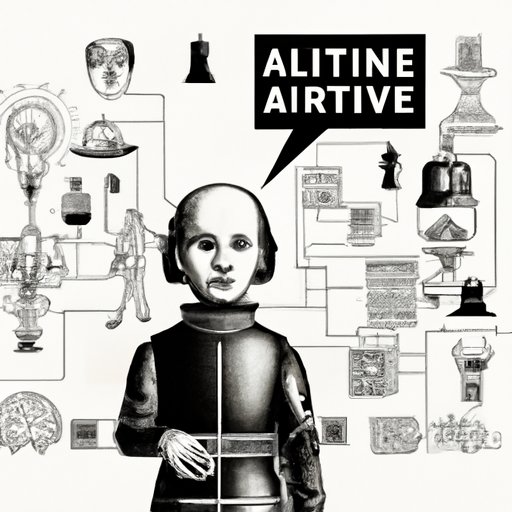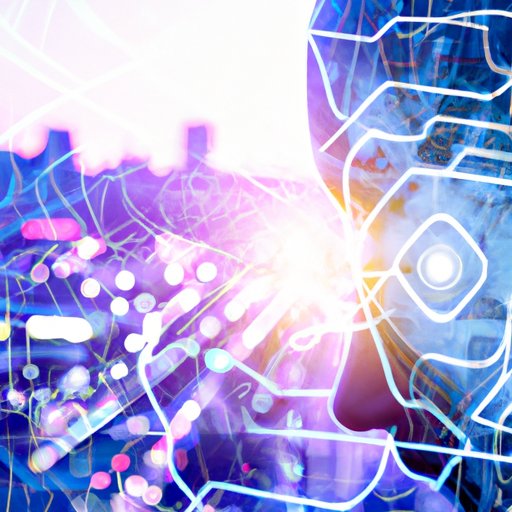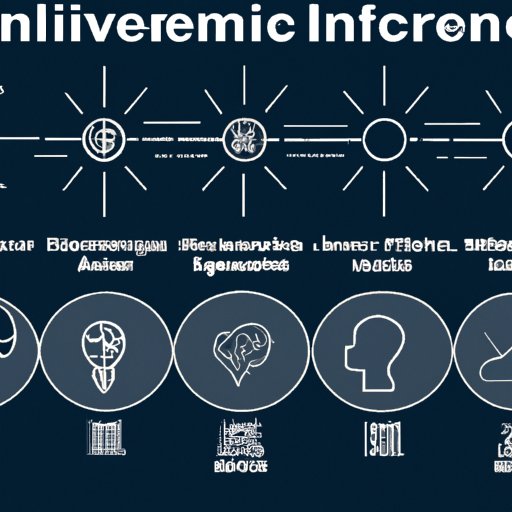Introduction
Artificial intelligence (AI) is a broad term that refers to the use of computer systems to simulate human intelligence. It includes machine learning, natural language processing, robotics, computer vision, and other forms of computational intelligence. AI has been around for decades, but its evolution has accelerated in recent years due to advances in computing power and data availability. This article will explore how AI has changed over time, examine its impact on society, and look at the role it plays in business today.

A Timeline of Artificial Intelligence: How Far We Have Come
Early AI research began in the 1950s, with the development of the first AI-based programs such as the General Problem Solver (GPS). In the 1960s, researchers made progress in areas such as natural language processing, robotics, and machine learning. In the 1970s, AI gained further traction with the development of expert systems, which are designed to emulate human decision-making processes. The 1980s saw significant advances in AI, including the introduction of neural networks, which are computer systems modeled after the human brain.
In the 1990s, AI research progressed with the development of genetic algorithms, which are inspired by natural selection. The 2000s saw the emergence of deep learning, a subset of machine learning that uses large datasets to make predictions and solve complex problems. The 2010s have been marked by the growth of AI-powered applications such as virtual assistants, autonomous vehicles, and facial recognition software.
These milestones in AI development have had a profound impact on our lives and enabled us to do things that were unimaginable just a few decades ago. As Dr. Stuart Russell, professor of computer science at UC Berkeley, explains: “The impact of AI on humanity is likely to be greater than any other technology ever invented.”

Examining the Impact of Artificial Intelligence on Society
The rise of AI has had far-reaching implications for society. One of the most significant impacts is automation, which has led to job losses in many industries. According to a study by McKinsey Global Institute, up to 800 million workers worldwide could be displaced by automation by 2030. While this may lead to short-term disruption, it could also create new opportunities in the long run as people shift to more productive roles.
AI has also improved efficiency and productivity in many aspects of life. For example, AI-powered chatbots can provide customer service 24/7 and automated scheduling systems can help streamline operations in businesses. Additionally, AI-assisted medical diagnosis and treatment has the potential to revolutionize healthcare and save lives.
Furthermore, AI has increased access to services in areas such as education, finance, and transportation. AI-driven online learning platforms have made education more accessible to people across the world, while fintech companies are using AI to make financial services more widely available. Finally, ride-sharing apps and autonomous vehicles have made transportation more convenient and affordable.
Despite these benefits, there are ethical considerations that need to be taken into account when developing AI-based systems. For instance, AI-driven facial recognition technology has raised concerns about privacy and surveillance. Additionally, algorithmic bias can lead to discrimination if not addressed properly. To ensure that AI is used responsibly, it is important for companies to take steps to mitigate risks and adhere to ethical standards.
Exploring the Evolving Role of Artificial Intelligence in Business
AI has become increasingly important in business over the past few years. Companies are leveraging AI-powered tools and technologies to gain competitive advantages and drive innovation. AI can help businesses automate mundane tasks, improve customer service, and optimize operations. Additionally, AI can be used to analyze customer data and uncover insights that can inform strategic decisions.
However, there are challenges associated with implementing AI in business. Organizations need to invest in the right technology, hire the right talent, and develop processes for managing data and AI models. Additionally, companies must ensure that their AI-based systems are secure and compliant with regulations. Despite these challenges, many businesses are seeing the value of AI and are investing in it for the long term.
There are several examples of companies using AI to innovate and drive growth. Amazon and Walmart use AI-powered supply chain management systems to optimize their operations. Google and Microsoft utilize AI to improve their search engines and develop new products. Additionally, banks are leveraging AI-based fraud detection tools to protect customers from cybercrime.

A Look at Advances in Artificial Intelligence Technology Over Time
Over the years, AI technology has advanced significantly. Machine learning, natural language processing, computer vision, and robotics are some of the key technologies driving the current AI revolution. Machine learning is a branch of AI that involves training computers to recognize patterns and make predictions based on data. Natural language processing enables computers to understand and generate human language. Computer vision is a type of AI that allows machines to interpret images and videos.
Robotics is an area of AI that deals with the design and development of robots. Robots are being used in a wide range of applications such as manufacturing, healthcare, and logistics. Additionally, AI-powered drones are being used to deliver goods and services in remote locations. These advances in AI technology have enabled us to automate many tasks and unlock new possibilities.
How Artificial Intelligence Has Changed the Way We Live and Work
AI has had a profound impact on our lives and the way we live and work. Automated systems have replaced manual labor in many industries and enabled us to do things faster and more efficiently. Additionally, AI-powered search engines have made information more accessible to everyone. Furthermore, AI-driven security measures have helped protect businesses and individuals from cyber threats.
Finally, AI has improved the quality of life for many people. Smart home devices, for example, allow us to control our homes remotely and automate everyday tasks. Additionally, AI-enabled healthcare technologies have made diagnosis and treatment more accurate and cost-effective. These advancements have enabled us to lead healthier, more productive lives.
Conclusion
AI has come a long way since its inception in the 1950s and has had a profound impact on society, businesses, and individuals. It has enabled us to automate mundane tasks, improve efficiency, and increase access to services. Additionally, AI has changed the way we live and work, making everyday activities easier and more convenient. As AI continues to evolve, it will no doubt bring even more changes in the years to come.
(Note: Is this article not meeting your expectations? Do you have knowledge or insights to share? Unlock new opportunities and expand your reach by joining our authors team. Click Registration to join us and share your expertise with our readers.)
